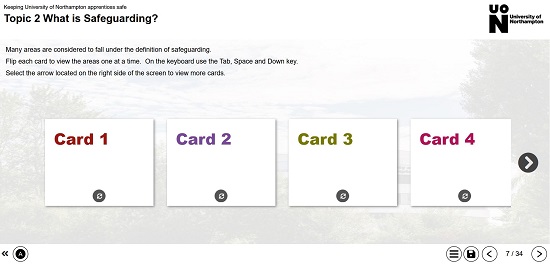Keeping University of Northampton apprentices safe
The University of Northampton is committed to the safety and wellbeing of our staff, students and apprentices. We have dedicated Safeguarding Officers in each of our Faculty who offer advice and guidance to ensure that apprentices are given the correct support.
The University takes its responsibility to ensure the safety of its apprentices seriously and that apprentices have a safe and positive learning environment throughout their training at the University of Northampton.
What is Safeguarding?
Safeguarding is the overarching term used to describe the protection of the health, wellbeing and human rights of individuals. Under the legislation, all parties involved in an apprenticeship must take reasonable action to minimise risks to apprentices.
What is Prevent Duty?
It deals with all forms of terrorism and with non-violent extremism, which can create an atmosphere conducive to terrorism and can popularise views which terrorists then exploit.
Development of e-learning course on Xerte
As part of our responsibility to ensure safety of our apprentices and to provide a safe and positive learning environment, we recently developed a Prevent and Safeguarding e-learning course in collaboration with the LLS team at the University. The course was developed on the Xerte software and is available to apprentices to access and complete on the NILE sites, under the relevant apprenticeship course pages. All apprentices must complete the e-learning course as part of their apprenticeship portfolio.
We worked with the LLS team, in particular Anne Misselbrook, E-Learning/Multimedia Resources Developer, to develop the course on Xerte. Initially, we only had a PowerPoint presentation and Anne was able to turn this into an interactive and user-friendly e-learning course on Xerte that apprentices can easily access and complete.

Review of the course
Anne developed a draft prototype for the course which we tested and the final version was then sent to the Apprenticeship programme leads to put on their relevant NILE sites for apprentices to complete. Anne provided clear instructions to the programme leads on how to embed the Xerte course on NILE.
We received feedback from some apprentices – one of the feedback was around apprentices only being able to see 97% completion rate although they had completed the entire course; the other feedback was about the results page initially showing 100% completion and then changing it to 0% completion.
We fed this back to Anne who instantly got in touch with the Xerte developers and was able to resolve both of these issues very quickly.
Final course distribution and communication
After the above issues were resolved, we all tested the course again and it worked perfectly fine. We then held a virtual meeting with the Programme Leads and Anne demonstrated how to upload the Xerte course to the relevant NILE sites (NILE Original and NILE ULTRA). The purpose of the meeting was also to try and mitigate any issues and make the process as smooth as possible for the programme leads and the apprentices. Anne provided detailed navigation instructions for apprentices to enable them to easily take the online course.
Anne reflects:
Simon Longhurst the University Apprenticeship Manager initially contacted Rob Howe, Head of Learning and Teaching in June 2021. The brief was passed to Anne by Rob Howe in June 2021. At this point, a set of PowerPoint slides were provided to Anne. A specific requirement is for the apprentice to provide evidence of completion of the e-learning course.
After significant investigation into the suitability of using Xerte Online Toolkits for the e-learning resource, Anne produced a storyboard and built a prototype to show Kulwinder Kaur, the Apprenticeship and Communications Officer who was responsible for implementation.
From October 2021 onwards, collaboratively working with Kulwinder over the next months on the shared Xerte meant that queries could be resolved, eg decision not to use an text fillable form due to an accessibility issue, and the Xerte evolved from prototype to final e-learning package.
As the apprentices are based at external organisation workplace the testing could not represent one hundred percent real-life end-user experience. However, Anne was able to liaise directly with some apprentices and ask them questions to gather their feedback.
Instructional guidance has been provided to the apprentices on best practice when using the Xerte e-learning. The number of apprentices at September 2022 is 234 with another 60 joining between January to March 2023.
Recent Posts
- Blackboard Upgrade – February 2026
- Blackboard Upgrade – January 2026
- Spotlight on Excellence: Bringing AI Conversations into Management Learning
- Blackboard Upgrade – December 2025
- Preparing for your Physiotherapy Apprenticeship Programme (PREP-PAP) by Fiona Barrett and Anna Smith
- Blackboard Upgrade – November 2025
- Fix Your Content Day 2025
- Blackboard Upgrade – October 2025
- Blackboard Upgrade – September 2025
- The potential student benefits of staying engaged with learning and teaching material
Tags
ABL Practitioner Stories Academic Skills Accessibility Active Blended Learning (ABL) ADE AI Artificial Intelligence Assessment Design Assessment Tools Blackboard Blackboard Learn Blackboard Upgrade Blended Learning Blogs CAIeRO Collaborate Collaboration Distance Learning Feedback FHES Flipped Learning iNorthampton iPad Kaltura Learner Experience MALT Mobile Newsletter NILE NILE Ultra Outside the box Panopto Presentations Quality Reflection SHED Submitting and Grading Electronically (SaGE) Turnitin Ultra Ultra Upgrade Update Updates Video Waterside XerteArchives
Site Admin

